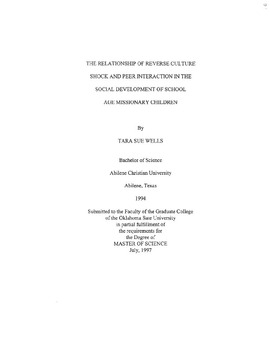| dc.description.abstract | Both the construct of repatriation and the research concerning repatriation are relatively new in the fields of family science and psychology. Printed information on repatriation started appearing in 1925, yet the vast majority of articles from 1925 to date are written informally in trade journals, church papers, and newspapers and are in narrative, autobiographical, biographical, or general information form (Austin, 1983). The topics of repatriation and the stress surrounding repatriation have personal significance for persons who have had the opportunity to experience this unique transition during their life cycle. In the past 30 years, the advent of relatively efficient and affordable international travel, advances in communication technology, expansion in the concepts of foreign aid and development, and expansion in international government and business interests have created a large expatriate community residing abroad (Stelling, 1991). The 1990 United States Census Data reported 922,819 American citizens as residing outside the United States and all its territories (US G. P.O., 1995). While the issues surrounding repatriation have come to the attention of multinational corporations, federal programs employing civilian and military personnel, study abroad and traveling scholar programs, and missionary societies, little definitive research on any aspect of reentry has been conducted. Repatriation can be defined as the transition period of returning to one's country and culture of origin after having resided outside the home culture for an extended period of time (Austin, 1983; Moore, 1982; Stelling, 1991). Synonyms for repatriation used in research and lay articles include reentry, reacculturation, remigration, and readaptation. Repatriation issues which concern international employers and employees center around the concept of reverse culture shock and its possible effects on individual workers and their family as a unit in terms of social, emotional, and work contexts (Kendall, 1981 ; Murray, 1973; Tucker & Wight, 1981; Smith, 1975). Stelling (1991)defines reverse culture shock as " ... the stressful experience of encountering or reencountering one's country and culture of origin after becoming accustomed to a foreign culture" (p. 1). Reverse culture shock is a concept used to help professionals, lay personnel, families, and individuals define and understand feel ings and emotions experienced by repatriating citizens. The possible outcomes of reverse culture shock include, but are not limited to: (a) hostility toward the American culture and a romantic idealization of the travel experience; (b) feelings of alienation or estrangement from Americans; (c) preoccupation with one's travel experience; (d) the feeling of having no role or position of importance at home and; (e) anger, depression or anxiety regarding changes in home life which occurred during travel (Austin, 1983 & 1986; Austin & Jones, 1987; Locke & Feinsod, 1982; Moore, Jones, & Austin, 1987; Shultz, 1986; Stelling, 1991). Three basic theoretical frameworks and models have been developed to show the processes involved in repatriation, though no known published studies on reentry have used the reentry theories or models as part of their theoretical framework. These rudimentary theories include: the W-curve hypothesis, a stage theory (Gullahorn & GuUahorn, 1963; Martin, 1984); a coping styles theory (Adler, 1980); and a culture learning theory (Martin, 1984). While few research studies on repatriation have been published (Austin, 1983), these publications can be divided into two main categories: (1) adult repatriation and (2) child repatriation. | |
